/ Undergraduate /
Start date:
September 2025
Entry tariff:
BEng: 112–128 UCAS points (or equivalent)
MEng: 120–136 UCAS points (or equivalent)
Foundation Year: 64–80 UCAS points (or equivalent)
UCAS code:
H200 (BEng)
H201 (if choosing foundation year)
H202 (MEng)
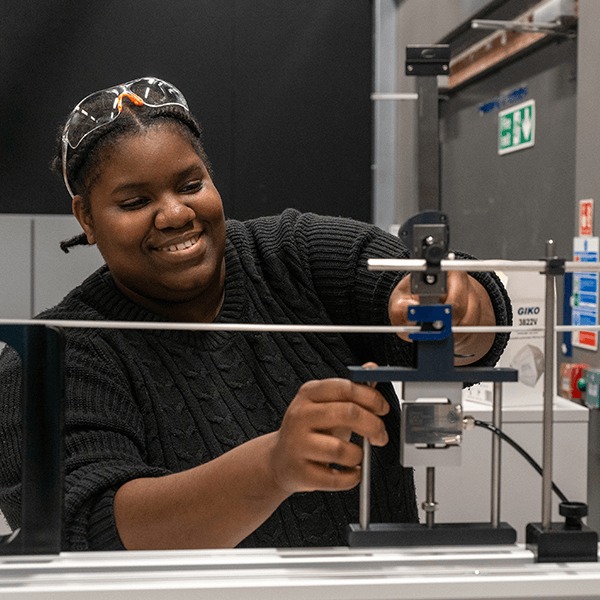
On-Campus Open Day
Saturday 12 July 2025
Our Civil Engineering programmes offer a comprehensive education in structural, environmental, and transportation engineering, with a focus on sustainability and innovation. Join us to build a rewarding career in shaping the world's infrastructure and addressing critical global challenges.
Did you know?
Our programmes are designed to address global skills needs, as well as the needs of national and regional employers, and meet the standards of professional bodies.
Top 3 modern university in London
(Complete University Guide 2025)

Ranked in the top 15% in the world
Times Higher Education Young University Rankings 2024

#8 in England for undergraduate student satisfaction
National Student Survey 2024

Foundation Year
This course can also be studied with a foundation year (September entry only).
Module overview:
The aim of the module is to introduce the foundational principles of statics, dynamics and mathematics for engineering. It explores the different types of stresses that materials undergo and how these materials respond under the influence of such stresses. The module extends its focus to statically determinate structures, and their behaviour under various stress conditions. Additionally, a crucial aspect covered is the concept of structural stability, exploring the factors that contribute to the equilibrium and robustness of structures.
The module places emphasis on the development of conceptual understanding of the physical world, including engineering artefacts and natural environmental processes, through the language of mathematics. It aims to reinforce and extend your understanding of core mathematical concepts used in the solution of engineering problems. You will develop proficiency in mathematical methods critical for engineering analysis and problem-solving. Recognising the pivotal role of quantitative reasoning in engineering, this module is designed to provide you with the necessary tools to analyse, model, and solve engineering problems
Furthermore, the module goes beyond theoretical frameworks and introduces practical considerations by addressing a variety of commonly used structural forms. Both qualitative and quantitative analyses are employed to describe the behaviour of these structures. Emphasis is placed on understanding complex states of stress within solids, and the intricacies of how materials respond when subjected to diverse and challenging stress patterns.
A significant facet of the module involves an exploration of the failure mechanisms inherent in materials. This includes an examination of the failure modes exhibited by both ductile and brittle materials. By scrutinising these failure mechanisms, the module equips you with the knowledge necessary to design structures that not only withstand various stresses but also maintain their integrity and safety over time. The teaching will include real life example of failure. The module serves as a gateway to the understanding of the principles governing the behaviour of structures under different loading conditions, and preparing you for the challenges of structural engineering.
How you'll learn:
You will learn through lectures, seminars, examples classes, experimental laboratories and practical applications. Students will be assessed through in-class tests and laboratory activities. You will be introduced to risk assessments for safe working practices in laboratories.
Module overview:
The aim of this module is to provide you with a comprehensive understanding of materials used in civil engineering and construction. The emphasis is on knowledge and understanding of the physical properties and embodied carbon in materials including environmental and sustainable considerations relating to their source, manufacture, use and disposal. Delving into the composition and properties of a diverse array of materials, the module offers an holistic exploration of the building blocks that form the backbone of construction practices with an awareness of the environmental impact.
You are introduced to the characteristics of various materials, ranging from traditional and modern materials through modern materials to minerals, rocks, and geological structures. The exploration extends beyond a surface-level understanding, aiming to provide students with appreciation of how each material contributes to the structural and functional aspects of civil engineering projects while considering their environmental footprint.
How you'll learn:
A significant component of the module involves hands-on experience through testing procedures, where you will actively engage in experiments to evaluate the properties of materials. Importantly, sustainability metrics are integrated into these evaluations, ensuring that you gain insights into the environmental impact and life cycle considerations of the materials that you study.
You will learn through lectures, seminars, examples classes, experimental laboratories and practical applications and will be assessed through project and laboratory activities. You will be introduced to risk assessments for safe working practices in laboratories.
Module overview:
This module has three distinct component parts: land surveying, drawings, and measurement. Through hands-on experience with professional surveying equipment and real-world fieldwork applications, you will develop industry-relevant competencies required in construction management, civil engineering, and building surveying roles.
In the first component, you will gain practical knowledge of surveying instruments used in industry, learning to conduct surveys, interpret results, and apply mathematical techniques such as trigonometry and coordinate geometry. By working in teams, you will simulate real-life surveying tasks, improving your ability to work collaboratively on-site, a key employability skill for surveying and construction professionals.
The second component develops your technical drawing abilities, both manual and digital (CAD, GIS, 2D/3D modelling), enabling you to create and interpret technical plans used in engineering and architecture. These skills are highly sought after in design, construction, and infrastructure projects.
The third component focuses on quantity measurement and costing, crucial for building surveyors and construction managers. You will learn to perform take-offs from drawings, apply measurement conventions, and use digital tools for managing construction information, such as BIM (Building Information Modelling).
This module prepares you for future careers in the built environment sector, enhancing problem-solving, digital proficiency, teamwork, and analytical thinking, all of which are essential for professional success.
How you'll learn:
This module is delivered using a practice-based, experiential learning approach, integrating hands-on fieldwork, problem-solving activities, and industry-standard software training.
Module overview:
This is the first in a series of Interdisciplinary Design Projects that continue in each year of the programme. The module integrates the skills and knowledge acquired on the programme to date. However, it goes beyond that in terms of integration in as much as you will work within interdisciplinary groups from across the SETEC undergraduate programmes. Further, as the programme gains new cohorts, you will also work with students in ‘vertical’ cross-cohort disciplinary groups where you are given the opportunity for peer-to-peer learning.
The aim is to begin developing skills in design through a series of design tasks that require the development of a range of options that would satisfy the design problem, and introduce the ways that professionals work collaboratively in design. These projects will usually be related to one of the key contexts adopted by SETEC, e.g. the UN Sustainable Development Goals and industry collaboration. The modules, and the ensuing design modules provide the basis for a continuing process of self-reflection and personal development.
A design brief will be set that introduces you to challenges that provide context for design, construction and operation/maintenance of built environment artefacts. You will work in inter-disciplinary (and vertical cohort disciplinary where appropriate) teams, to identify and produce a concept design. You will learn about creativity in design, effective processes for rationalising ideas and solutions, how to integrate and balance professional roles and perspectives, and effective teamwork and communication of possible design solutions.
It will involve elements of design including form, function, space texture, balance, rhythm, emphasis, proportion and unity. It will involve producing designs expressed in hand drawings and computer aided drawings and physical models. It will also require plain language concise descriptions of the problem, the design process and the outcome design.
How you'll learn:
There will be taught elements by either lecture or seminar / workshops which include an introduction to ethics, equality and diversity, project planning, site layout, risk management, environmental assessment, Health and Safety management techniques, searching for relevant literature, summarising literature, writing of technical prose and critical thinking.
Please note, these modules may be subject to change.
Module overview:
This module covers structural design processes in concrete, masonry, timber, and steel, emphasizing elastic structural analysis methods and virtual work. You will gain proficiency in analysing elastic indeterminate structures and understanding loadings and structural stability. The module covers use of matrix methods and stiffness methods.
Practical application is emphasized through hands-on exercises and projects. The module links to Interdisciplinary Design Project 2, enabling you to apply theoretical and analytical skills in a real-world context. It includes lectures, problem classes, practical work, and guest lectures from industry experts.
How you'll learn:
You will learn through lectures, seminars, examples classes, experimental laboratories and practical applications. You will be assessed through in-class tests and laboratory activities. You will be introduced to risk assessments for safe working practices in laboratories.
Module overview:
This module aims to provide a comprehensive exploration of soil mechanics and its applications in Civil Engineering. The module is structured to develop understanding of the fundamental principles governing site investigation methodologies, laboratory testing of soils, and hence soil behaviour.
You will engage in both desk-based geotechnical studies and practical laboratory sessions. Emphasis will be placed on soil sampling techniques and the interpretation of site investigation reports and hands-on experience in assessing various soil properties. You will gain insights into the real-world implications of soil behaviour and its significance in Civil Engineering applications. The module covers the bearing capacity design of shallow foundations and their settlement. The skills acquired in this module are directly relevant to the challenges faced in the field of geotechnical engineering, preparing you for future professional practice.
How you'll learn:
The module will be delivered through a mix of lectures, laboratory sessions, case studies, problem classes and practical fieldwork. Guest lectures from industry experts may be included to provide insights into the practical applications of geotechnical engineering. You will be required to comply with risk assessment for working in the geotechnics laboratory.
Module overview:
This module will provide you with a comprehensive understanding of fluid mechanics, focusing on the principles that govern fluid behaviour and their applications in civil engineering. You will develop knowledge of fluid statics and dynamics, including the equations that describe fluid flow and their use in designing pipes, open channels, and hydraulic machines.
You will explore fluid mechanics principles in real-world engineering contexts, learning how to analyze fluid behavior and apply theoretical concepts to practical scenarios. The module also focuses on designing systems for fluid transport, emphasizing problem-solving, critical thinking, and technical skills essential for professional engineering roles.
How you'll learn:
By engaging in laboratory work, computational modeling, and site visits, you will apply your knowledge to real-world case studies. Assessment will be through in-class tests and laboratory reports, ensuring that you can demonstrate both conceptual understanding and practical problem-solving skills.
Module overview:
In this module you will apply the knowledge and skills acquired at Level 4 and during Level 5 to a multi-faceted design problem of a building or part of one, develop holistic design thinking, further embed approaches to design that are sustainable and carbon neutral, in particular novel materials, timber and reused or recycled steel and carbon accounting for construction, and to continue with self-reflection and collaborative practices with other disciplines. Further, the project will usually be related to one of the key contexts adopted by SETEC, e.g. the UN Sustainable Development Goals and industry collaboration. Further, where appropriate, you will also work with other students in ‘vertical’ cross-cohort disciplinary groups where you are given the opportunity for peer-to-peer learning.
The content is delivered in the context of a design project in which you play the role of a professional within your discipline within a broader design team. This module employs an experiential learning approach, integrating problem-based learning (PBL) and collaborative, interdisciplinary teamwork to simulate professional practice.
You will present your design appropriately using hand-drawn sketches, computer generated graphics, computer aided drawings, physical models, calculations, specifications, and bills of materials/ quantity. You will be developing your knowledge of computer assisted design and engineering in context and its value in terms of optimisation and parametric design.
How you'll learn:
The project has an individual component and a groupwork component. A combination of tutorial and design studio sessions will be used to generate the designs and track progress.
You will continue your planning and recording of self-learning and development as the foundation for lifelong learning / CPD. This will be continued within each Interdisciplinary Design Project at each level of the course.
Please note, these modules may be subject to change.
This course offers all students the option of a one-year paid work placement, to boost your employability even further. If you choose this route, you will take the placement following year two of your course, and then return to complete your degree.
Why take a placement?
A placement year is the perfect opportunity to gain valuable work experience, to build on the career skills we will teach you on this degree. The connections you make on the placement will improve your career prospects further, and equip you with the skills you need to secure graduate-level employment.
How we support you
The University's Placement and Work Experience Team are experts at helping you to secure a placement. They will work closely with you from the start, helping you research potential employers, discover placement opportunities, create and pitch your CV, and will coach you to perform well in interviews. We aren't able to guarantee a placement, but our sector-leading advisors will give you the best possible chance of securing one.
Find out more about how we'll support you
We understand that your plans might change once you start your programme. If you decide not to do a placement, you will have the option of completing the three year version of your programme.
Whatever your choice, you will have access to many opportunities for work experience through our Placement and Work Experience Team, and access to face-to-face and 24/7 online careers support.
These modules are those we currently offer for 1 year (full-time) and may be subject to change.
- Lorem ipsum dolor sit amet, consectetur adipiscing elit. Nulla varius
Module overview:
The Further Structural Analysis module explores more advanced structural analysis techniques. The primary aim is to cultivate the necessary knowledge, understanding, and skills to analyse and solve complex problems associated with multi-variable structural systems. This includes an in-depth focus on both statically determinate and indeterminate structures, with an extended emphasis on the analysis of plates.
Emphasis is placed on the application of theoretical knowledge to real-world engineering problems. You will engage in practical problem-solving exercises, case studies, and a design project that requires the application of advanced structural analysis techniques to address complex engineering challenges.
The module introduces you to the Finite Element Method (FEM), a powerful numerical technique widely used in structural engineering. You will not only understand the theoretical foundations of FEM but will also gain practical experience through the use of finite element analysis software, preparing them for sophisticated analysis and design tasks. The module also extends your knowledge to include structural dynamics.
The module also covers design processes for foundations, retaining walls, and slopes. The primary objective is to equip you with in-depth knowledge and skills essential for designing resilient, effective and stable support systems within the broader context of civil engineering projects. This module builds upon knowledge acquired in earlier modules, specifically the Level 5 structures and soil mechanics modules.
How you'll learn:
The module will be delivered through a mix of seminars, workshops, and site visits. Practical design exercises and case studies will be integral to the learning process, allowing you to apply theoretical concepts to real-world scenarios. Interaction with industry practitioners and guest lecturers will provide additional insights.
Module overview:
This module explores the theoretical foundations of highway and railway geometric design and construction, with an emphasis on sustainable travel solutions. It equips you with the knowledge and skills required to design transport alignments, including horizontal and vertical geometry. The module builds on Level 5 knowledge from Fluid Mechanics and Soil Mechanics and incorporates aspects of water management in infrastructure design.
A critical aspect of transport design is managing water around infrastructure. The module examines both traditional (grey) drainage solutions and nature-based (blue-green) solutions, which restore water cycles and provide environmental benefits.
Throughout the module, you will engage in practical design exercises, a group transport alignment project, and a feasibility study on drainage systems. Industry guest lectures and site visits will supplement your learning, exposing you to real-world challenges and innovations.
How you'll learn:
The module will be delivered through a mix of seminars, workshops, and site visits. Practical design exercises and case studies will be integral to the learning process, allowing you to apply theoretical concepts to real-world transportation and projects. Guest lectures from industry experts will provide additional insights.
Module overview:
This module provides you with the opportunity to independently investigate a selected topic of interest in a built environment related issue, and the scope may include, if appropriate, the development of a design. The design option is for students of who would like to carry out an individual design project and is primarily aimed at students who are enrolled on programmes that involve some level of design discipline. You will need to take responsibility for managing your time, identifying objectives and follow a systematic approach to explore, and possibly solve, a problem, or generate a design. It includes the production of a report of the investigative project.
You will select a topic for research or design provided by prospective supervisors, or they may propose a topic for research to the module leader who will seek a suitable supervisor. Proposed topics may be the subject of further discussion and development before they are mutually agreed by you and your proposed supervisor.
The project will typically be of an investigative nature, exploring and extending your knowledge of the chosen subject within the context of the construction industry. A design project will also require a good degree of investigation on your part. You are expected to demonstrate an understanding of fundamental principles of research, follow research ethics and appropriate methodologies for collecting and analysing primary and / or secondary data and communicate your findings to a professional standard. You will be required to submit an application for ethical approval for the research prior to any primary data collection involving human subjects. You will also need to develop a risk assessment for all practical work either in the field or laboratory.
How you'll learn:
There will be a programme of lectures and seminars at the beginning of the module to introduce you to research techniques and appropriate methodologies. This will include coverage of appropriate statistical techniques that you may need to adopt. Online resources will be provided to support the investigation. Specialist librarian support will be provided to help you with literature searches and use of software for citing articles and providing their bibliographies in a reference list. You are expected to show considerable initiative throughout the duration of the module and schedule supervision meetings with their supervisors.
Module overview:
In this module, you will further develop your ability to design larger-scale built environment artefacts of a more complex scale for a specific development site. The projects will usually be related to one of the key contexts adopted by SETEC, e.g. the UN Sustainable Development Goals and industry collaboration. You will also work with students in ‘vertical’ cross-cohort disciplinary groups providing additional opportunity for peer-to-peer learning.
You will conduct research on the background of the site and explore developments in design and construction practices and techniques. It will therefore contain research methods teaching, also required for the Investigative Project. This instruction will build on that provided as part of Integrated Design Project 1 and 2. You will develop your understanding and application of project planning, cost estimation, risk assessment, ethics, sustainability, and Equality, Diversity, and Inclusion (EDI). It will also cover matters connected with search and retrieval of academic and grey literature, constructing text which summarises current known knowledge, critical thinking, the construction of technical reports, and writing.
How you'll learn:
You will work collaboratively to develop built environment proposals for a concept scheme at a specified development site, which may include geotechnical, water design and transport (such as pedestrian and cycle access within the perimeter). Working in teams, you will be presented with a brief that they will need to interpret, and where necessary challenge, in order to develop a programme of integrated activity.
Please note, these modules may be subject to change.
Module overview:
The module is aimed at developing understanding of vibration in structures, and gives you the skills required in using analytical and numerical assessment techniques with a focus on methods of damping and seismic design. You will develop a deep understanding of vibration phenomena in structures; skills in employing both theoretical and computational methods to predict and evaluate the dynamic response of structures; and skills in seismic analysis and design codes to ensure structural resilience in seismic-prone regions.
Building upon foundational knowledge from level 5 and Level 6 modules in structures, this module ensures a progressive and in-depth understanding of dynamic behaviour in structures. The module will also cover structural forensics in relation to measuring real-time stresses and strains, structural responses and condition.
How you'll learn:
Practical exercises and case studies will be integral to the learning process, allowing you to apply advanced theoretical concepts to real-world structural dynamics and earthquake engineering challenges. The incorporation of these practical exercises ensures that you gain hands-on experience, preparing you for challenges encountered in the field of civil engineering, particularly in seismically active regions.
Module overview:
The module offers an in-depth exploration into the advanced behaviours of materials. The primary objective is to develop a comprehensive understanding of material innovations and introduce you to methods for assessing embodied carbon and sustainability in the context of materials choice. Building on the foundational knowledge gained in the earlier module in Civil Engineering Materials and Soils, this module considers advanced concepts to allow you to make sophisticated decisions about materials for Civil Engineering projects.
In addition to material behaviours, you will be introduced to cutting-edge material innovations, including advanced composites, smart materials, and nanotechnology. You will also be encouraged to foster an awareness of emerging materials that push the boundaries of traditional construction materials, providing new possibilities for structural design and performance.
You will be equipped with the skills to assess the embodied carbon and sustainability implications associated with different materials choices. You will also explore life cycle assessment methods to evaluate the environmental impact of materials throughout their life cycle, from extraction to disposal.
How you'll learn:
The module will be delivered through a combination of lectures, seminars, and workshop/laboratory sessions. Practical exercises, case studies, and exposure to industry practices will provide you with hands-on experience in assessing and selecting materials based on advanced behaviours and sustainability criteria.
Module overview:
This module offers a comprehensive exploration into the potential and limits of geotechnical models. The primary objective is to develop a deeper understanding of soil stress and strain modelling, enhance skills in numerical methods, and extract valuable lessons from geotechnical engineering failures. This module further extends its scope to encompass geo-environmental engineering, considering the interaction between geotechnical processes and the environment. Building on skills and knowledge gained in earlier geotechnical modules, this course equips you with advanced tools to tackle complex challenges in geotechnical engineering.
You will analyse and extract valuable insights from geotechnical engineering failures, to understanding the contributing factors and lessons learned. From this you will learn to apply failure analysis to improve future geotechnical design and decision-making.
Looking beyond the geotechnical modelling and analysis, you will be introduced to the principles of geo-environmental engineering, examining the interaction between geotechnical processes and the environment. You will also address challenges related to the impact of geotechnical projects on environmental sustainability.
How you'll learn:
The module will be delivered through a combination of lectures, seminars, and workshop/laboratory sessions. Practical exercises, case studies, and exposure to industry practices will provide you with hands-on experience in assessing and selecting materials based on advanced behaviours and sustainability criteria.
Module overview:
In this module, you will extend your design capabilities to the highest levels by engaging with complex engineering problems. You will work on real-world projects that require managing uncertainty, using engineering judgment, and evaluating the sustainability and ethical implications of design solutions. You will develop skills in critical analysis, creative problem-solving, and stakeholder communication. Throughout the module, you will apply emerging technologies and innovative design methods to create solutions that align with industry standards and the UN Sustainable Development Goals. By working in teams and independently, you will enhance your ability to collaborate across civil engineering disciplines and reflect on your professional development.
The design brief will allow you to develop skills in critical analysis and managing ambiguity. The solution will need to address client and stakeholder requirements and project risks. Through the design process you will have an opportunity to apply creativity, innovation and technical knowledge to produce design concepts and develop a design solution. The solution should meet current and future needs and consider both current and emerging technologies. It should also take into account the appropriate UN’s Sustainable Development Goals.
How you'll learn:
You will work in groups and individually to produce a design solution for a design brief, which fully considers issues in connection with sustainability, ethics and equality, diversity and inclusion. The engineering problem allocated to each group will be selected to allow collaborative working across different civil engineering disciplines.
Please note, these modules may be subject to change.
This course offers a foundation year, which takes place at the beginning of your studies. Studying a foundation year will give you academic and practical experience, and a strong introduction to your subject, ensuring you succeed on your undergraduate degree.
30 credits
You will develop your core academic and integrated English language skills of speaking, listening, reading and writing. You will become familiar with key academic skills and concepts, such as referencing methods and awareness of academic integrity and tone. You will apply these skills and knowledge to both broad topics and also your chosen subject pathway.
Teaching and learning
You will be required to actively engage in on-campus learning for up to 10 hours a week.
You will be taught through a full range of teaching and learning methods, which include lectures, seminars, workshops, discussion groups, group directed tasks and presentations. This will enable you to learn from your peers and tutors in both structured and information settings.
You will be encouraged to think creatively about your approach to learning and discussions with your peers. You will also have access to recordings, resources, links and signposting through Moodle to enrich your learning.
Assessment
You will be assessed through group and individual presentations, comparative and reflective essays, multiple choice exams, coursework and reports, oral exams, portfolios, case studies and blogs.
30 credits
You will develop your research, numeracy and information technology skills. You will investigate the difference between primary and secondary research, conduct your own research project and demonstrate your findings through data analysis. You will also develop your awareness of equality, diversion and inclusion in the UK, through a real-world issue; discrimination in the workplace.
Teaching and learning
You will be required to actively engage in on-campus learning for up to 10 hours a week.
You will be taught through a full range of teaching and learning methods, which include lectures, seminars, workshops, discussion groups, group directed tasks and presentations. This will enable you to learn from your peers and tutors in both structured and information settings.
You will be encouraged to think creatively about your approach to learning and discussions with your peers. You will also have access to recordings, resources, links and signposting through Moodle to enrich your learning.
Assessment
You will be assessed through group and individual presentations, comparative and reflective essays, multiple choice exams, coursework and reports, oral exams, portfolios, case studies and blogs.
30 credits
This module is designed to provide a comprehensive introduction to the essential concepts, skills, and knowledge required for a successful career in the built environment. You will explore a wide range of topics that lay the groundwork for further study and professional development in fields such as Civil Engineering, Architecture, Construction Management, Architectural Technology and surveying, among others.
Teaching and learning
This module employs a variety of learning methods to enhance understanding and engagement, which includes lectures, interactive workshops, case studies, practical exercises and field trips, group discussions, guest speakers and digital learning.
The teaching delivery for each module consists of one, one-three-hour lecture and one, two-hour seminar per week. Lectures will cover core indicative content, while seminars will consist of research workshops, as well as small group learning on relevant case studies.
Seminars will also be used to provide practical observation opportunities (or simulated observations) for you to reflect upon implementation of policies and professional skills.
You will also have an additional 30 minutes of online support each week to develop your communication skills as well as providing you with opportunities to explore wider practices.
Assessment
This module will be assessed using a report and a presentation.
60% - written report, on a clear assessment brief.
40% - individual presentation, which will be peer, and tutor assessed for the quality of the presentation and response to questions.
30 credits
This module provides a comprehensive exploration of various aspects crucial to the basic understanding of designing and managing the built environment effectively. From foundational principles to cutting-edge innovations, this module aims to equip you with the knowledge and skills necessary to navigate the broad built environment sector.
Teaching and learning
This module employs a variety of learning methods to enhance understanding and engagement, which includes lectures, interactive workshops, case studies, practical exercises and field trips, group discussions, guest speakers and digital learning.
The teaching delivery for each module consists of one, one-three-hour lecture and one, two-hour seminar per week. Lectures will cover core indicative content, while seminars will consist of research workshops, as well as small group learning on relevant case studies.
Seminars will also be used to provide practical observation opportunities (or simulated observations) for you to reflect upon implementation of policies and professional skills.
You will also have an additional 30 minutes of online support each week to develop your communication skills as well as providing you with opportunities to explore wider practices.
Assessment
This module will be assessed using a report and a presentation.
60% - written report, on a clear assessment brief.
40% - group presentation, which will be peer, and tutor assessed for the quality of the presentation and response to questions.
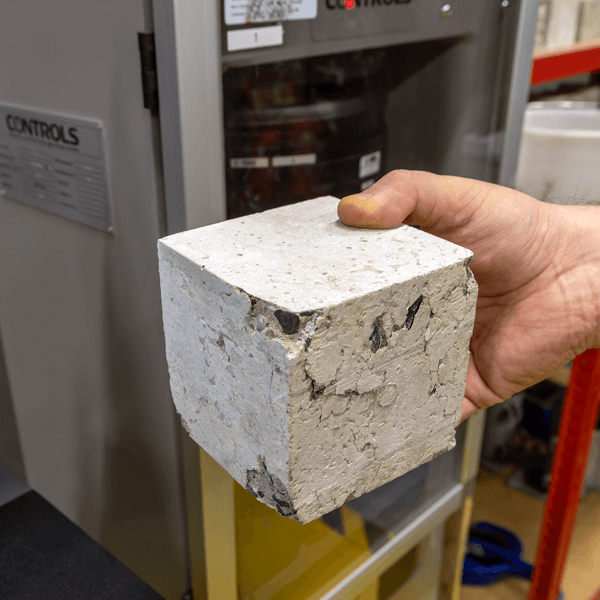
Skills
Graduate with an advanced set of skills and professional expertise, ready for industry.
Civil Engineers are responsible for designing, constructing, and maintaining infrastructure projects such as roads, bridges, buildings, and water systems. They ensure that projects comply with legislation and safety standards and plan projects, manage construction activities, and oversee the work of contractors and site operatives. They assess the environmental impact of projects, solve complex engineering problems, and ensure the structural integrity and sustainability of the infrastructure they create.
Throughout your time at Roehampton, you’ll develop your technical expertise, problem-solving, communication, and leadership skills. You will graduate ready to excel in the dynamic field of civil engineering upon completing our BEng/MEng degrees.
Learning
Our dynamic approach to learning will prepare you for the real-world of civil engineering.
- Learn alongside other sustainable engineering and technology students just like you will as a professional.
- Project-based learning will give you the practical experience of working as a Civil Engineer.
- Formal and interactive lectures and workshops to ensure you graduate with the technical expertise you need.
Sustainability is central to Civil Engineering and will be embedded in everything you learn, with a particular emphasis on good health and well-being, clean water and sanitation, affordable and clean energy, and sustainable cities, and communities.

Professor Stephen Pretlove
Hello, I am Stephen Pretlove, Director of Sustainable Engineering, and I have been at Roehampton since July 2023. I have an educational background in construction, engineering, architecture and environmental design, and I have worked as an academic for over 30 years in a number of large built environment departments across the UK.
My role at Roehampton is to lead on the development of our new sustainable engineering and technology centre, and to establish and deliver a suite of innovative engineering and built environment programmes, focusing on sustainability, green skills, and meeting the zero carbon targets set by the UK government.
My research focuses on sustainability in the built environment, and the need to take a holistic approach to how buildings are designed, how they are constructed, and how they are occupied. Failure in any of these areas results in buildings that are not sustainable and much of my work involves Post Occupancy Evaluation (POE) of buildings, particularly social housing, to evaluate how a building performs in relation to the design intentions.

Lilian Martins da Silva
Hello, I am Lilian Martins da Silva and I have been at Roehampton since January 2024. I have a background in architecture and sustainable building technology, I have been practicing both for over 20 years in Brazil and in the UK. I have been responsible for delivering environmental design solutions towards net zero, working with design teams to provide innovative solutions at all design and planning stages in a challenging and fast-moving market. I have experience of working on a wide range of projects where I have integrated technical analysis and environmental policies into coherent recommendations and developed a strong consultative and client service approach. My areas of expertise include architecturally driven whole-life carbon strategies, environmental design, low-energy building design, daylight and thermal modelling, planning, and environmental certifications (BREEAM, LEED, and WELL).
I am a chartered engineer in the UK and a chartered member of CIBSE and a LEED educational programme reviewer. My role at Roehampton is to integrate sustainability into teaching to enable students to work on projects with real case scenarios.
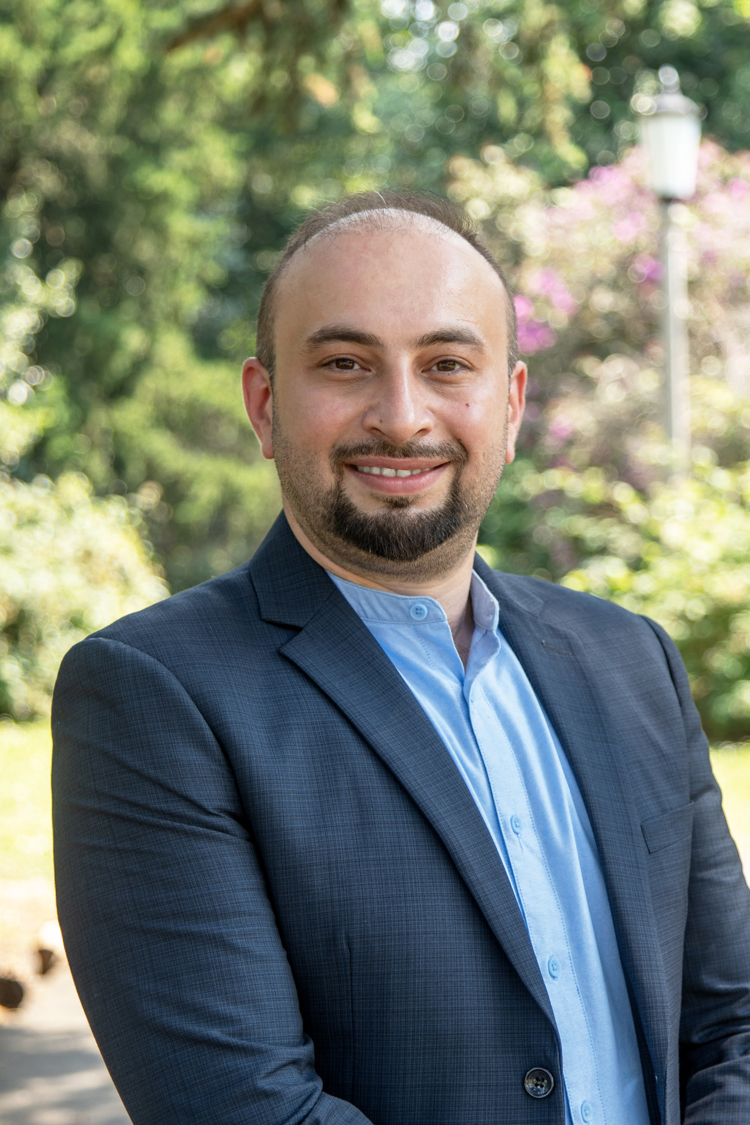
Mohanad Abobakr
Hello, I am Mohanad Abobakr, and I have been at Roehampton since June 2024. With a background in architecture, Façade Design and Construction, I have over a decade of experience as a healthcare architect and lecturer. My work has spanned globally, focusing on designing healthcare facilities such as hospitals, medical facilities, and various healthcare environments, where I have managed design and construction processes to foster a conducive environment for healing and well-being. This involves overseeing the construction of critical spaces in healthcare facilities and ensuring compliance with international standards.
In academia, I bring this real-world experience to the classroom, enriching students' learning with practical insights from my extensive project portfolio. My research is dedicated to integrating sustainable design principles into healthcare environments, in alignment with the United Nations Sustainable Development Goals. I explore innovative solutions, particularly in hygienic surface materials, to enhance infection control while minimizing environmental impact.
At Roehampton, my role is to infuse sustainability into teaching and learning, empowering students to confront real-world challenges head-on. Together, we are paving a path towards a greener, more resilient future.

Ourania Tsioulou
Hello, I’m Ourania Tsioulou, Senior Lecturer in Civil Engineering and I have been at Roehampton since July 2024. I am a civil Engineer, and I have extensive academic experience for over 10 years in various civil engineering departments across the UK.
My main research interests bridge the areas of rehabilitation and strengthening of existing structures, and the development of novel sustainable construction materials, with particular interest in a) replacement of cement with waste materials such as Pulverized Fuel Ash and b) replacement of aggregates with recycled materials such as recycled concrete, glass or rubber.
My role in Roehampton is to motivate students and ensure they gain the knowledge and develop the skills to investigate, define, and solve real world problems, identifying any constraints including structural, environmental and sustainability limitations, ethical, health and safety issues. My teaching is strongly linked with industrial experts and laboratory based activities, which enable students to visualize, understand and apply complex aspects of civil engineering discipline.

Jane Ballantyne
Hello. I am Jane Ballantyne, and I have been at Roehampton since July 2024. I worked in private practice in London for over 20 years before moving into higher education a few years ago. I am a Chartered Building Surveyor and a Fellow of the Royal Institution of Chartered Surveyors (FRICS).
My main expertise is with existing buildings, in particular refurbishment, adaption and retrofitting; and building pathology which involves recognising and diagnosing defects, proposing solutions and implementing these. I hope to inspire students to appreciate the existing built environment which has a huge role to play in sustaining our future; from the social capital generated by historic buildings and the use of traditional building materials; to retrofitting buildings to reduce carbon emissions and adapting them to be more climate resilient. I am particularly interested in building conservation and retrofitting of traditional buildings.
I bring my experience into my teaching, using authentic assessments and problem based learning, for students to develop the key skills they need in the workplace.
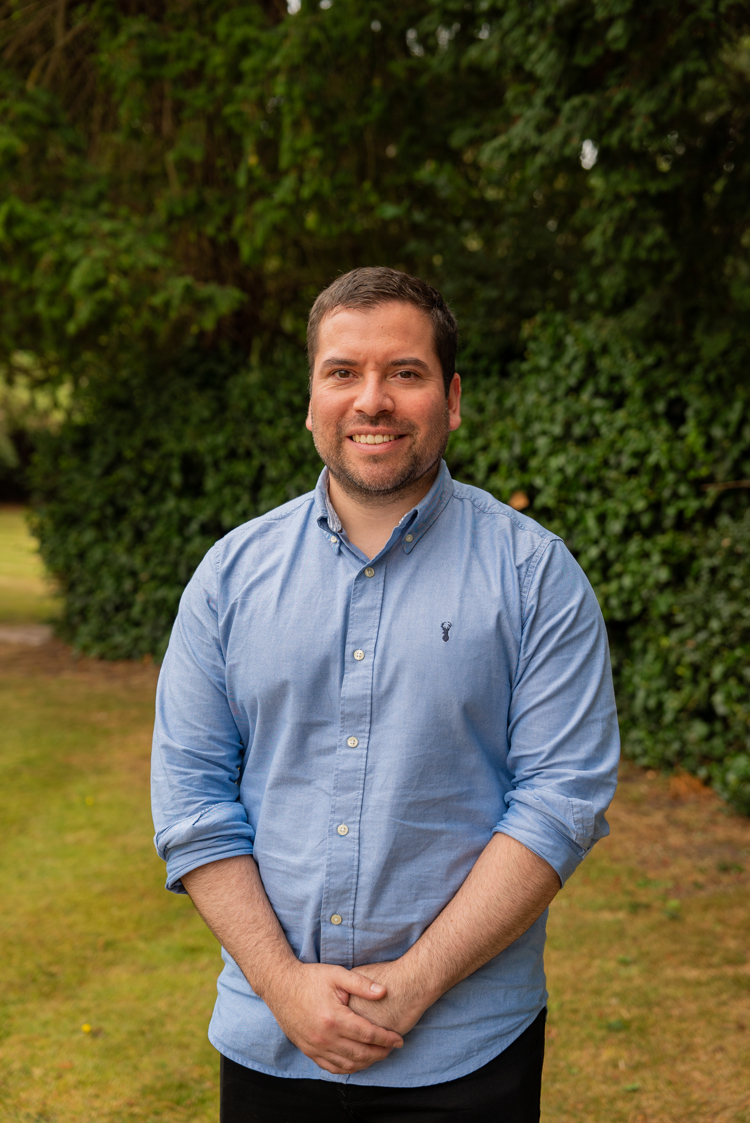
Felipe Mellado
Hello, I am Felipe Mellado, and I have been at Roehampton since August 2024. I worked in industry for a few years before moving to academia in 2015. I am a Construction engineer with an MSc in Construction management and a PhD in Civil Engineering (Construction Management).
My main expertise is in managing construction projects, sustainability, and innovation. I am eager to help students realise their potential and inspire them to significantly impact the built environment sector. Individual contributions can play a huge role in the country's economy, creating jobs and infrastructure for other industries.
I am particularly interested in sustainability in the built environment and construction management's role in reaching industry targets. I bring my experience into my teaching, using real-world examples and scenarios to prepare students for the challenges the industry faces.

Thadshajini Suntharalingam
Hello, I am Thadshajini Suntharalingam, Senior Lecturer in Civil Engineering, and I have been at Roehampton University since August 2024. My work has been largely focused on academia and I have academic and research experience for over 5 years in various civil engineering departments across the UK.
My expertise lies in advancing low-carbon concrete, 3D printed concrete structures, modular construction systems, and overall sustainability. My research is dedicated to developing innovative solutions for reducing the environmental impact of construction, including the optimization of 3D printing technology for concrete structures and exploring low-carbon and recycled materials.
At Roehampton, my focus is on preparing students to meet the complex challenges of the construction industry, with a particular emphasis on sustainable engineering practices. I aim to provide experiential, hands-on practice through teaching that bridges theory with real-world application. Also to create a learning environment where students develop practical skills and insights to address future challenges in a rapidly evolving field and contribute to innovative, sustainable engineering solutions.

Well-being Pawfficer
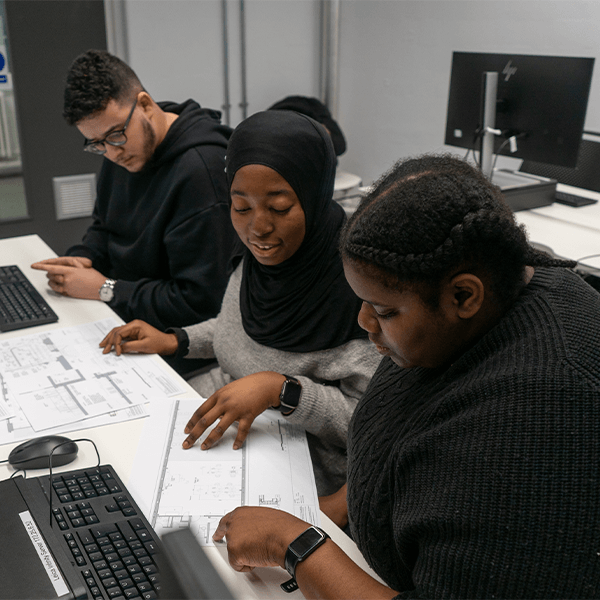
Assessment
You’ll be set authentic assessments, meaning that your projects, tasks and exercises will replicate the working world of civil engineering.
This could include:
- Technical reports
- Lab reports
- Essays and presentations
Between Years 2 and 3, you can also opt for a professional placement year, meaning you have the opportunity to apply for a placement and gain valuable real-world experience.
Career
You’ll graduate with a huge range of opportunities in the built environment sector.
In London and around the UK there are Civil Engineering employers who offer opportunities in areas of design, consultancy, structures, railways, coastal, transport, water and infrastructure.

We sat down with Jamie Pemberton who works as a Principal Engineer at Form Structural Design, to discuss what it is like working in civil engineering, the types of projects he works on and more!
Open days
Get a real taste of our campus, community and what it’s like to study at Roehampton
Applying
Full-time UK undergraduate students apply through UCAS.
Entry tariff
BEng: 112–128 UCAS points (or equivalent)
MEng: 120–136 UCAS points (or equivalent)
Foundation Year: 64–80 UCAS points (or equivalent)
Looking to work out your UCAS points or find out about our entry requirements? Find out more.
When we consider applications to study with us, we form a complete view of your achievements to date, and future potential, and can offer flexibility in entry requirements. Find out more about our Contextual Offer scheme.
Specific entry requirements
GCSE requirement: Maths and English, Grade 4/C.
A level (or equivalent): Maths, Grade C.
General entry requirements
September 2025 entry tuition fees
UK (home) tuition fees
Undergraduate degree: £9,535
Foundation Year: £9,535
We offer a wide range of scholarships and bursaries. See our financial support pages for UK students.
We also provide other ways to support the cost of living, including free buses and on-campus car parking, hardship support and some of the most affordable student accommodation and catering in London. Find out more about how we can support you.
International undergraduate students apply through our direct application system.
Entry tariff
Looking to work out your UCAS points or find out about our entry requirements? Find out more.
When we consider applications to study with us, we form a complete view of your achievements to date, and future potential, and can offer flexibility in entry requirements. Find out more about our Contextual Offer scheme.
General entry requirements
September 2025 entry tuition fees
EU and international tuition fees
Undergraduate degree: £19,500
Foundation Year: £19,500
International Foundation Pathway: £16,950
We offer a wide range of scholarships and bursaries. See our financial support pages for international students.
We also provide other ways to support the cost of living, including free buses and on-campus car parking, hardship support and some of the most affordable student accommodation and catering in London. Find out more about how we can support you.






